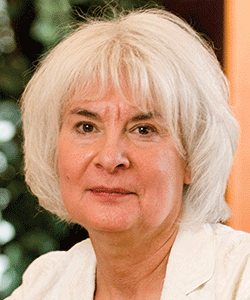Ellen M. Markman

Photo courtesy of Stanford News Service.
Stanford University
William James Fellow Award
Ellen Markman’s work has covered a range of issues in cognitive development. She conducted some of the pioneering research on the development of comprehension monitoring in children. Much of her work has addressed questions about the relationship between language and thought in children focusing especially on categorization and inductive reasoning and on how infants and young children figure out the meanings of words.
In particular, Markman addressed the question of how young children solve the inductive problem that word learning poses. Very young children are surrounded by a huge array of objects, all unfamiliar; yet, despite their limited information-processing abilities, children are remarkably capable of categorizing objects and learning object labels. When someone points to an object and labels it, the word could, in principle, refer to the object itself, its color, size, shape, texture, attractiveness, and so on. She contends that in order to learn the meaning of a word, children make use of three basic principles: the whole object assumption (words refer to an object rather than to its parts or features), the taxonomic assumption (labels should be extended to an object of the same kind rather than an object that is thematically related), and the mutual exclusivity assumption (each object has only one label).
In her landmark work on early conceptual and lexical development, Markman has challenged the fundamental assumptions of traditional theories of word learning and provided new insights into the nature of children’s categories.





APS regularly opens certain online articles for discussion on our website. Effective February 2021, you must be a logged-in APS member to post comments. By posting a comment, you agree to our Community Guidelines and the display of your profile information, including your name and affiliation. Any opinions, findings, conclusions, or recommendations present in article comments are those of the writers and do not necessarily reflect the views of APS or the article’s author. For more information, please see our Community Guidelines.
Please login with your APS account to comment.